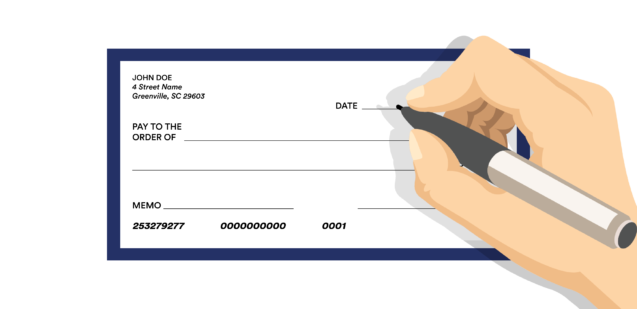
Sooner or later, the time is going to come when you start to consider making a big purchase — something more significant than your day-to-day budget allows or accounts for.
It could be that you’re tired of renting, realizing how much more home you could afford if you were to buy your own, and you’re ready to make that jump. Or maybe you’re thinking about upgrading your car for space or luxury or transporting a growing family. From power tools to home appliances, computers, and more, the item may be something you’ve always wanted or dreamed of owning - but the hefty price tag is a huge financial commitment, one that can cause a bit of purchase anxiety. As a result, it is important to never make a big purchase decision without conscious review or consideration. If you do, you may wind up not only racking up some serious debt and getting a major case of buyer’s remorse, as well.
Sometimes these big-ticket items can be practical purchases, like new software or a piece of equipment that can take you from hobbyist to small business start-up. Other times they appeal more to your sense of adventure or need for escape, like a new video game console or a vacation for your family. But regardless of what it is that has you thinking about breaking the piggy bank, there are things you should consider before you raise that hammer.
Sometimes these big-ticket items can be practical purchases, like new software or a piece of equipment that can take you from hobbyist to small business start-up. Other times they appeal more to your sense of adventure or need for escape, like a new video game console or a vacation for your family. But regardless of what it is that has you thinking about breaking the Before we jump in, one caveat we must call out. In this post, we are referring to a “next big purchase” as something you don’t have to have, but simply WANT. Life has a way of throwing us unexpected surprises that may cause you to have to make a big purchase you NEED (such as new tires) - regardless if we can afford it or not. But for this post, know that we are talking about purchases you simply want but don’t necessarily need.
Six Questions to Ask Yourself
1. Can I afford it?
It seems simple to start with, but the first question you should ask yourself is this: can you afford it? If you can’t afford the item in question, can’t save up for it in a reasonable amount of time, or meet the criteria necessary to get a loan for it, then you might as well stop here. Until money starts growing on trees, it’s a futile effort to consider purchasing something that you can’t afford. You could also consider a less expensive alternative to purchase instead or take the time to do a bit of planning for the big purchase, such as answering: Do you know how much home you can afford? Have you considered a smaller or a used car instead of a larger, brand-new model?
2. Do I really need this?
Once you determine if you can truly afford the item, the next question becomes: do you really need it? You should examine your potential purchase through the lens of necessity. Is it necessary to buy this and give it lasting space in your home or life? (“Necessity” in this case is an item that will provide you with “value” - a time-saving convenience, a simple life pleasure, needed rest and relaxation, and so on.) If yes, it’s good to know that you may have other options besides an outright purchase. Take your vacation plans, for example. In lieu of a cruise or cross-country vacation, you might consider trading spaces with a faraway friend for a week. Need new tools for that big landscaping project? From chainsaws to carpet cleaners, there are many things that you can rent or borrow instead. Explore all your options!
3. Does this have a lasting purpose?
One thing you’ll want to consider for any large item that you buy is whether it has a lasting purpose, or if it is more of an impulse buy. To determine something’s long-lasting value, try to estimate its “use” factor. How much will you actually use this item? Is it something that will show up in your day-to-day life, or will it take up closet space for most of the year? Also, how long will it last? Is it a tool that you can pass down a generation, or one that will burn out in a year or two? The bottom line is this: if the price tag doesn’t meet the return on your investment, you may want to reconsider its value to you in the long run.
4. Does this duplicate something else I already have?
We all love shiny new things! But you may discover that you already own an item that accomplishes the same tasks of that shiny new thing. This is especially true in kitchen appliances, where the newest thing on the market is often just rehash of another tool. Blenders, food processors, hand mixers, and stand mixers do a lot of the same things. The same can be said of numerous power tools, jewelry, and more. So before swiping the card, be sure to take a stroll around the house to look for something you may already have that can provide the value needed.
5. Do I benefit from buying this now?
Sometimes, you can be better off financially by holding off on a purchase; other times, you can reap higher benefits from buying now. Some examples? Buying new mattresses during a large holiday sale can save hundreds of dollars, and buying a car at the end of the month (or even better, the end of the year) may save you thousands. In cases such as these, the now-or-later question is determined by whether you can make the purchase within the optimal window of time. Of course, if your laptop has died today and you need it to generate revenue or help your kids with homework, the benefit of savings may be outweighed by the more immediate need.
6. Is it worth it?
As you go through all of these questions, you’ll likely end up with one final point that can serve as the determining factor: is this purchase worth it? While something’s worth to you can be determined by answering the questions above, you should also examine the thing itself. For products, look at reviews online. For services (like travel planners), research their history through the Better Business Bureau. Ask your friend and family network — chances are you know someone who has already bought the thing you’re considering and can give you some additional insight. And finally, make sure you’re getting the best price. Can you find it cheaper somewhere else? Do you have a promo code for an added discount?
All of these suggestions will help you make the best choice possible.
You're all in; now what?
We applaud you for going through that thorough and conscious consideration process. If your resulting answer is “yes, your next step is to figure out the best method to pay for it. If your budget allows you to pay for it outright, go for it! If not, check out the two paths below for tips to budget and save for the big purchase. If it’s a very large purchase such as a house or car, you may even want to consider loans available to you.
1. Budget.
A best practice is to figure out how this purchase will fit into your budget. If you have some extra disposable income, that may be applied to saving for the big purchase. If not, you may have to lower the amount in one area of your budget, reallocating the funds in order to save for the big purchase. If getting a loan, you will need to account for making monthly payments and consider other associated costs. For example, if buying a home, you may have to pay Private Mortgage Insurance or closing fees or if buying a car, you will have to pay for car taxes, tag, and title fees. In short, you’ll want to review in finer detail how this big buy will affect your bottom line.
2. Save up.
While saving big amounts of money can seem intimidating, remember — anything is possible! Whatever the amount, set up a savings plan ahead of time to put yourself in a good position for your purchase. You may even want to consider a sinking fund — a fund you set up and pay into for a future purchase, rather than making payments on a past one. Some examples of sinking funds include Christmas Saving Club and Vacation Club accounts, which are designed to let you save up for those big expenditures before you actually need the money.
This material is for educational purposes only and is not intended to provide specific advice or recommendations for any individual.



